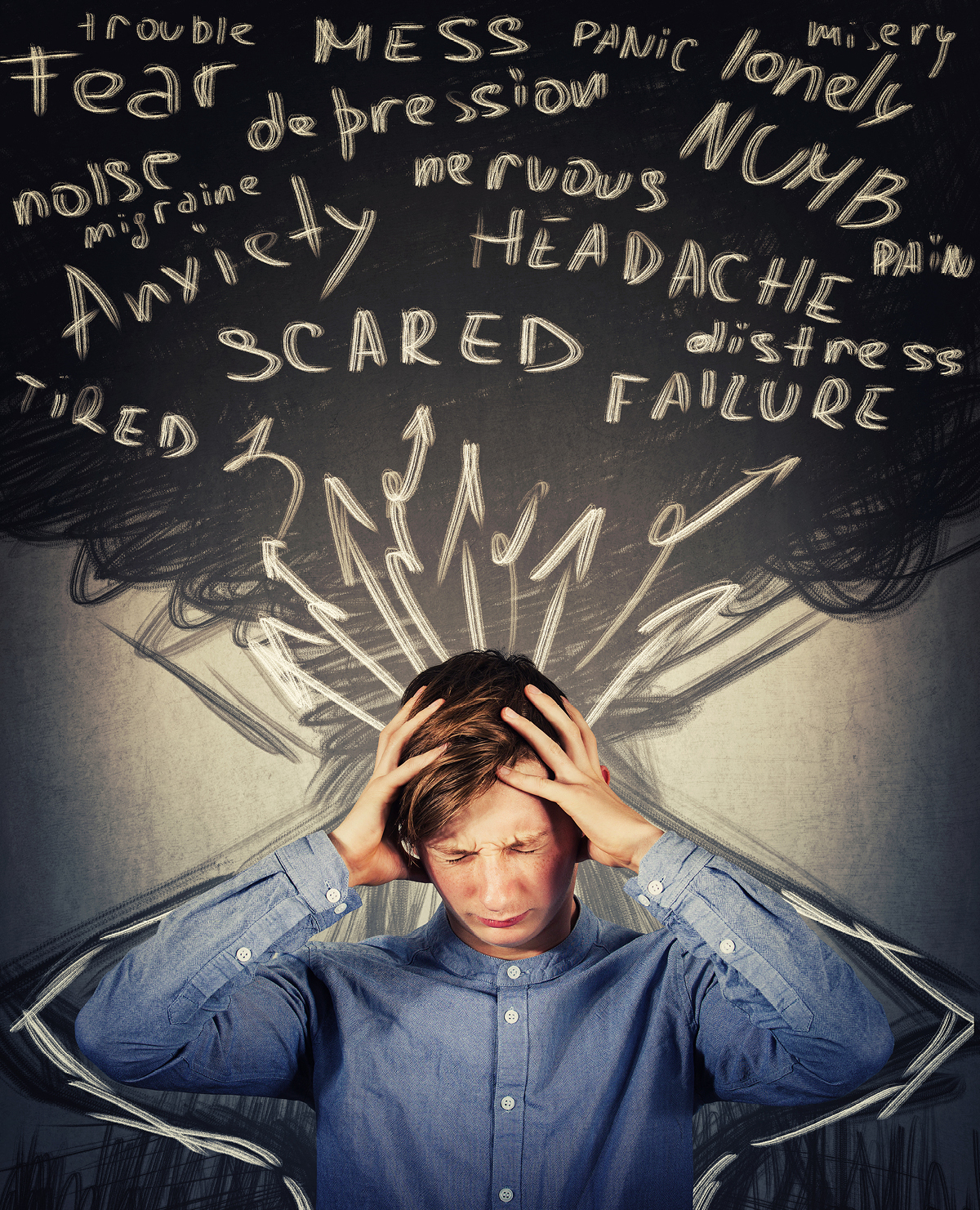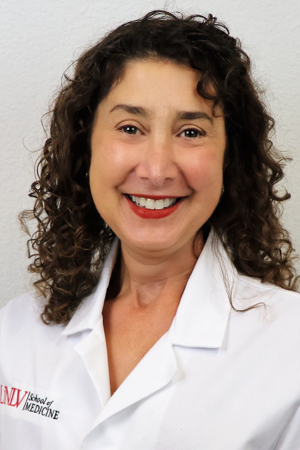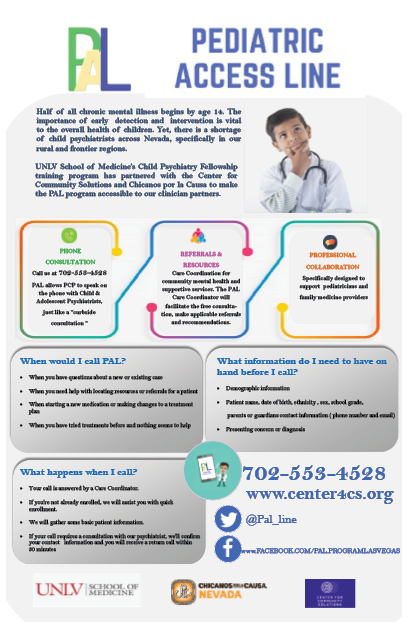Calling a PAL

By Paul Harasim
The problem has festered for years: Half of American children with mental health issues aren’t receiving the necessary treatment. Trying to ameliorate the problem in Nevada is the life’s work of Lisa Durette, MD.
Even five daunting and frightening encounters with cancer — chemotherapy blackened skin was shed from much of her body during one series of treatments where death seemed a certainty — hasn’t stopped the child psychiatrist from continuing to work to increase access to mental health treatment for children.
In 2012, Durette, well aware that Nevada has long held the dubious distinction of being among the states with the fewest mental health services in the country, opened the Healthy Minds outpatient treatment facility, a psychiatric center in Las Vegas. In 2013, she began to increase the number of child psychiatrists in Nevada by founding and directing the two-year fellowship in child and adolescent psychiatry that is now part of the Kirk Kerkorian School of Medicine at UNLV.
 At present, this assistant professor of psychiatric medicine at the medical school is also leading a medical team that is providing a unique model of care through telephonic and televideo consultation, where real time mental health care expertise is shared with family, pediatric, and primary care physicians who call them when troubled youth show up at their offices. A Mental Health Block Grant won by Durette supports what is known as the Pediatric Access Line (PAL) project, which is similar to state programs first carried out in Massachusetts.
At present, this assistant professor of psychiatric medicine at the medical school is also leading a medical team that is providing a unique model of care through telephonic and televideo consultation, where real time mental health care expertise is shared with family, pediatric, and primary care physicians who call them when troubled youth show up at their offices. A Mental Health Block Grant won by Durette supports what is known as the Pediatric Access Line (PAL) project, which is similar to state programs first carried out in Massachusetts.
“We know there is a giant shortage of child psychiatrists, and this is a way to provide more access,” says Durette. “This program also helps with stigma problems. Many parents are reluctant to take their children to a mental health professional because of the unfortunate stigma involved with mental health. This way, they can keep their child in the primary care home and still get the mental health help their child needs.”
Durette’s medical team is largely derived from the fellowship she founded, as well as from health professionals from the Center for Community Solutions and Chicanos por la Causa. Not surprisingly, COVID-19 and its resulting isolation of children has made the need for assistance more acute. A call to PAL generally results in physicians receiving assistance within 30 minutes, so the patient is still at the doctor’s office when a treatment plan is discussed. Durette and two doctors in her fellowship program, Colin Freedman, MD, and Chau Pham, DO, along with contracted child psychiatrist Amanda King, MD, are key figures in the sharing of psychiatric information. Alba Perez, Angela Townsend, and Brooklyn Ives, of Chicanos por la Causa, coordinate the care.
David Savarese, MD, director of the UNLV Health Pediatric Clinic, says the program affords expertise that children would have to wait up to three months for if they made an appointment with one of the state’s few child mental health professionals. He says after calling the PAL line, he’s been able to help several children, including a 17-year-old girl deal who was dealing with depression. At one point, she got to talk, through telemedicine, with a psychiatrist. On another occasion, Savarese called the PAL line and was able to find the right medication for a 10-year-old developmentally delayed child who frequently engaged in behavior injurious to herself.
“We can’t expect pediatricians to handle mental health problems without this kind of support,” Savarese says.
In March, when the program began, there were seven requests from primary care physicians for consultations. Now there are up to six in a day. More than 170 clinicians from throughout the state have opted into the program. A website has been created for the project, www.center4cs.org, which includes educational materials and videos
“If there’s a situation with a youth for whom the direction, diagnosis, or treatment options aren’t clear, we’re able to offer televideo consultations for the patient within a week, after which we send treatment recommendations back to the primary care team,” Durette says.
Given her own healthcare challenges over the years, the more remarkable it is that Durette (along with her staff) are energetically leading the charge for better mental health care for Nevada’s children and their families. She serves as chair of the Nevada Mental and Behavioral Health Commission, president of the Nevada Council of Child and Adolescent Psychiatry, and is the Nevada delegate to the American Academy of Child and Adolescent Psychiatry.
When she was just 8-years-old, Durette knew she wanted to be a physician. Two presents from her family — the Visible Man Anatomical Science Model Kit, which allowed her to paint all of the vital organs, coupled with a microscope that allowed her to see individual cells – sparked an interest in medicine that has never died. She soared academically in K-12. Not being challenged by her courses, Durette went to France as an exchange student and became a high school dropout by choice. She left high school as a junior and won a scholarship to Agnes Scott College in Atlanta.
On paper, her time as an undergraduate in the early 90s appears to be nothing more than a positive affirmation of her drive and academic talent. But it was then that she began her fight with cancer, a life and death struggle that’s lasted on and off for more than two decades, one that’s seen her wearing a temporary “F--k Cancer” tattoo during treatment which often leaves her nauseous and vomiting. During her sophomore year, she got Hodgkin’s lymphoma. For four months, she scheduled her daily radiation treatment between classes so she could progress at the proper pace for graduation. Her hair became an accessory she had no problem living without. Less than a year later, her junior year, the lymphoma came back. This time, she had to leave college for a semester, though she enrolled in a microbiology course at a community college that she knew would help her with the MCAT (medical school admissions test). For the exam, she was allowed to bring a thermos of ginger tea to the test site so she could manage her nausea.
She graduated on time from college in 1995, with honors in both chemistry and French, and entered medical school.
“I never let getting sick get in my way,” Durette says. “If anything, it fuels me to work harder, as if every day is the last and I need to squeeze every bit out.”
Durette went on to receive her MD from the University of South Carolina and completed her residency in psychiatry and fellowship in childhood and adolescent psychiatry at the Medical University of South Carolina. Her experience with cancer had helped further convince her of the importance of a healthy mind in navigating life.
 Her future couldn’t have looked brighter. In 2004, she moved to Las Vegas because she saw how great the need was for mental health professionals in Nevada. That same year she married psychologist Robert Durette.
Her future couldn’t have looked brighter. In 2004, she moved to Las Vegas because she saw how great the need was for mental health professionals in Nevada. That same year she married psychologist Robert Durette.
Cancer appeared to be in her rear-view mirror. She let the good times roll, dancing and hiking and loving when she wasn’t helping patients. While working in private practice and as a psychiatric consultant and adjunct professor at the Touro University College of Medicine, she became pregnant, something she feared may not happen because of her previous chemotherapy treatment. In 2008, her daughter, Allison, was born. In 2011, with the help of her husband and another psychologist, Ken McKay, she opened Healthy Minds. Two years later she began the fellowship that has seen all but one of the graduating fellows stay in Nevada.
In 2014, many of the good times stopped rolling. Durette became one of the nearly 1.7 million Americans diagnosed with cancer that year. This time it was thyroid cancer. “We were really worried – the cancer was traveling in her body,” recalls her husband, Robert.
Surgery took care of the cancerous thyroid, but Durette started therapy again to deal with her anxiety. “I’ve struggled with anxiety and depression when my cancer comes back,” she explains. “I didn’t want to be a person who focuses on their cancer all their life.”
In 2016, she was once again diagnosed with cancer – Hodgkin’s lymphoma yet again. Psychologist Ken McKay, her colleague at Healthy Minds, says that when Durette received a phone call informing her that she had cancer again, she said, “Dammit, I’ve got cancer again” and then went on working, even during chemotherapy. “She doesn’t let it rule her life.”
Lisa Ruiz-Lee, a former director of Clark County Family Services, who now owns a consulting firm that advises nonprofits, says she believes Durette’s advocacy for children has helped her survive her repeated battles with cancer. Like Durette’s husband and Alison Netski, MD, the department chair of psychiatry at the Kirk Kerkorian School of Medicine, Ruiz-Lee says Durette’s sense of purpose gives her strength. “She really is remarkable. She is tenacious about pursuing things that help this community and its children. She wants to make a difference.”
In 2018 and into 2019, Durette was tested like never before. Hodgkin’s lymphoma. Again. This time she went to the world’s premier cancer center, MD Anderson, in Houston. She was there for months, receiving a stem cell transplant. Doctors told her husband she might not survive. “Chemo had actually burned her skin from the inside out and then peeled off,” Robert says. “You can imagine the pain.”
As Durette, 47, looks back on her time with cancer, she doesn’t suggest she’s some kind of Wonder Woman”
“To say that I’ve cried a lot and experienced an enormous amount of psychological pain is an understatement. How I’ve dealt with these various traumas is by allowing myself to feel the pain, not hiding it or hoping it will go away on its own. I’ve honored those feelings. I set aside time to fully experience them before moving forward, but I knew, even while crying my eyes out, that I was going to eventually move forward, this was just a normal and necessary step in the healing process. Sharing these experiences and feelings with my family and support network of friends, which I affectionately refer to as my ‘FightClub,’ has been essential to my healing, and I’m also incredibly thankful to have a wonderful therapist I can talk with as well. Mental health professionals rely on mental health professionals, too.”
In Nevada, the Pediatric Assistance Line, staffed from 9 a.m. to 5 p.m. M-F, is 702-553-4528. The number should be used only by health professionals working in primary care settings. Relatives of children who learn about the program should ask their child’s primary care physician whether the program could help their child.
